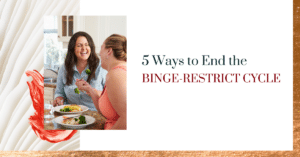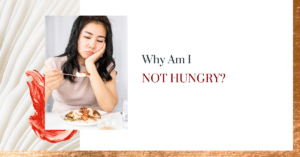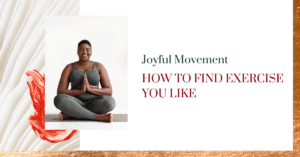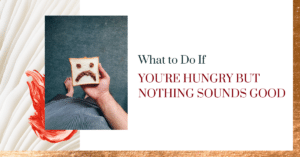9 Non-Diet New Years Resolutions

Heading into January, it’s natural to want to start planning ahead and thinking about what you want to accomplish over the next year. If you’re looking to incorporate more of the non-diet approach into your life, check out the non-diet New Years resolution ideas below for some inspiration.

A new year brings a fresh start, which is why almost 50% of Americans will make New Year’s resolutions. Many of these resolutions revolve around “health,” but generally through the very narrow lens of weight loss. While other aspects of health are sometimes acknowledged when it comes to setting resolutions for the new year (sometimes), the top resolutions still seem to revolve around dieting and weight loss.
And despite everyone’s good intentions, only 8% of people actually manage to follow through with their resolutions. This is due, in large part, to the fact that many resolutions are restrictive, not realistic for a person’s lifestyle, and are focused on weight loss.
Perhaps this is the year you decide to NOT go on a diet?
Easier said than done, I know. The fact of the matter is we live in a pretty wild diet culture. It seems we can’t go anywhere without someone talking about their new diet or their weight or their body size. Whether it’s the person in line at the coffee shop, the tech support woman on the phone, or a reverend at church, diet culture is everywhere (and yes, all three of these scenarios happened to me recently).
Not to mention that we are entering “National Dieting Month” (as my non-diet colleagues and I like to half-jokingly call January) which means that dieting ads are ALL over TV, magazines, social media and more.
So as you take some time to reflect back on the year and make plans for the upcoming year, I wanted to give you some suggestions of non-diet New Year’s resolutions to try instead of the typical diet/weight loss/hit the gym routine.
Instead, this year, can you resolve to reject the old dieting cycle in favor of truly improving your mental and physical health? Approaching food in a non-diet way and working to improve your relationship with food can actually be one of the most important things you can do for yourself and your health.
Non-Diet New Year’s Resolutions
1. Shift Your Language
Language is powerful. The ways you talk about food (and bodies) affect your thoughts, emotions, and behaviors. Using binary terms like should/shouldn’t, good/ bad, healthy/unhealthy, guilt-free/indulgent, or clean/toxic causes a split between body and mind. Rather than listening to your internal signals of hunger, satisfaction, and fullness, you end up reacting to the language and labels placed on food.
Eating foods that you’ve labeled as “bad” or “unhealthy” can also cause increased feelings of guilt (hello, food police!) and shame. Likewise, describing food as “good” or “healthy” can also be a harmful type of binary thinking. When someone thinks of a food as “good,” they usually assume it’s better for them (known as the health halo effect), which often leads to eating more of the food, regardless of how hungry the person is or whether they like the food. Similar to words like bad or unhealthy, good and healthy also pull us outside of our body cues
Suggestions: Try to use more neutral, nonjudgmental terms to describe food, such as nourishing, delicious, comforting, fueling, fun, colorful, or satisfying. Aim to avoid using absolute terms like “must,” “perfect,” “should,” “shouldn’t,” “bad” or “awful.” Instead use words like “may,” “can” and “is OK,” as in, “I can eat whenever I’m hungry” or, “It’s OK to have dessert two nights in a row.”
2. Only Buy Clothes That Fit
While I know it can seem scary to buy bigger clothing, this is one of the things that my clients tell me helps to most improve their body image in the short run. When we’re wearing clothes that are too tight or that we don’t like, our body image is heightened and it’s easy to feel bad about ourselves. No more overanalyzing sizes this year or buying for a body that doesn’t exist. Be kind to yourself!
Suggestions: Head to the store and pick out several different sizes. Put them on with your back to the mirror, turning around only if it feels good to you. For a larger range of sizes, check out online retailers like Asos, Torrid or Coedition.
3. Make Time for 5 Minutes of Daily Self-Care
Make time to manage stress and decompress, even for just a few minutes each day. This could be a walk around the block at lunchtime, a quick meditation on the train to work, a few minutes of deep breathing at your desk, curling up on the couch with a good book, or brewing yourself a pot of warming tea.
Make it a point to take at least five minutes for yourself every day, even if you have to set a reminder or schedule it into your calendar. Even just a few minutes can help to lower stress hormones and feel more relaxed. Plus, when you truly care for yourself in all realms – not just the physical, but mentally, emotionally, spiritually – you’ll feel happier and more fulfilled.
Suggestions: Make a list of a few relaxing things you can do in five minutes and pick one each day.
4. Establish a Nightime Routine
If you struggle with falling asleep at night, a nighttime routine can be really helpful to train your body that it’s time to wind down. The light from phones, computers, and TVs can mess with our circadian rhythm, so finding a technology-free way to end the night – or at least the last half an hour of the night – can really help your body be more ready for sleep.
Suggestions: Try to shut off all electronics at least 30 minutes before bed, drink a warm cup of caffeine-free tea, read or journal in bed (instead of going on your phone) or listen to a bedtime meditation.
5. Stop Comparing Yourself to Others
With social media, we now have a near-constant view into other people’s lives. It is all too easy to compare yourself to these people and wish for their “perfect” lives. But the truth is…it’s not real. That perfect breakfast photo took someone an hour to set up and take (and their kid is probably screaming in the background). Instead of comparing yourself, focus on what you have that makes you happy. Accept that everyone is different, and work on being content with yourself.
Suggestions: Unfollow people on social media who trigger these comparison feelings or who make you feel bad about yourself. Likewise, follow a diverse range of accounts that show all sorts of body shapes and sizes.
6. Practice Cultivating Gratitude
Can you take a few moments each day to reflect and connect with experiences as they are happening? Can you practice being grateful for all aspects of our lives that we are thankful for, however small it feels. This could be a warm cup of coffee in the morning, time to sit and chat with a friend, your favorite tv show, the sound of your children’s laughter, or a nourishing meal.
It doesn’t always have to be something deep; it can be as simple as, “I sat in the sun for five minutes at lunch today,” or “I got to talk to my niece on the phone.” It’s okay if you’re grateful for the same things each day (the latte from my local coffee shop ends up on my list several times a week). It is the conscious and intentional practice of reflecting and writing down what you’re grateful for that helps.
You can practice gratitude at any moment of the day, but I find it most helpful to take a minute or two at the end (or the beginning) of each day to write down a few things for which I am grateful in that moment. Even if you think you know what you are grateful for, writing it down can be a powerful way to see it spelled out in print and is especially useful for the days when you are feeling down
Suggestions: For one week, spend two minutes each night (or each morning) writing down five things that you are grateful for that day.
7. Develop More Coping Mechanisms
Aside from taking part in regular self-care practices, it’s important to cultivate multiple coping skills that you can use when you struggle in a more acute way. Make a list of several different coping skills that you can call upon when needed. Coping mechanisms can fall into several buckets including connection, relaxation/calming, pleasure, and movement/energizing. Coping can also look like saying “no” and setting boundaries with work, family, and friends to prioritize your mental and emotional well-being.
Suggestions: The next time you are feeling down, upset, or in need of some de-stressing, pull out the list and pick one of the tools. It will take some practice and experimenting, but over time you will get better at both identifying the emotion you’re feeling and picking a strategy that you know will help you feel better.
8. Practice Joyful Movement
Aim to make movement more intuitive and joyful, rather than exercising as a punishment for eating certain foods — this can help you to develop and maintain a consistent movement routine. Shift your focus on how it feels to move your body rather than calorie-burning.
Pay attention to how different forms of movement (dancing, walking, jumping around) make your body feel and work to try out different types of exercise or movement, to find several that are fun and joyful to you. Be mindful of what your body feels like doing in the moment. Some days that might mean you go for a run or a bike ride, others it may mean a relaxing yoga class or short walk outside.
Suggestions: Try doing a short body scan to begin tuning into your body’s physical and emotional state. It takes less than a minute and can even be done while you are lying in bed after you wake up. Starting at the top of your head, focus on each of your body parts and how they are feeling. This will help you figure out how your body is feeling that day – whether it is tight and sore, stressed and wound up, or loose and energized.
9. Try Quieting Down.
With our phones a constant companion, it’s so easy to turn to scrolling to numb or distract ourselves. (I find myself reaching for my phone when I’m waiting for a website to load! Hello lack of patience/being used to instant gratification…).
I love a podcast and music as much as the next person, but sometimes just letting my mind be free to wander while I am walking to work is the best medicine. Often I end up solving problems or figuring out feelings just by opening up the space to do so. It is in these moments of quiet – away from other people and from other inputs – that we can hear ourselves think.
Suggestions: Aim for at least 10 minutes of distraction-free time most days of the week.
One last thought: if the idea of making any resolution this year just feels exhausting or stressful — listen to your gut! Sometimes we just need to keep on keeping on, and not try to set any goals – this is completely ok too.
What are your non-diet New Year’s resolution ideas? Share with me below!
Looking for more support?
We work with clients virtually throughout the US, helping people who are frustrated with dieting change their relationship with food and say goodbye to diets once and for all. Learn more about our intuitive eating coaching programs to see how you can find balance and develop long-term lifestyle habits, no diets required.
Looking to learn more about intuitive eating on your own? My Unapologetic Eating 101 Course is a self-paced online course that walks you through the foundational principles of intuitive eating, body image healing, mindfulness, self-compassion, and more.
Author Bio
This article was written and reviewed by Alissa Rumsey, MS, RD, CSCS, a registered dietitian and Certified Intuitive Eating Counselor. She specializes in weight-inclusive care, intuitive eating, body image healing, mindfulness, self-compassion, and healing from chronic dieting, disordered eating, and eating disorders. Alissa holds a Bachelor’s Degree in Nutrition and Exercise Science, and a Master’s Degree in Health Communications, and is also an NSCA Certified Strength and Conditioning Specialist.
share the love

about
Alissa Rumsey, RD.
Alissa Rumsey, MS, RD, CDN, CSCS (pronouns she/her/hers) is a registered
dietitian, nutrition therapist, certified intuitive eating counselor, and the author of
Unapologetic Eating: Make Peace With Food and Transform Your Life. Alissa is
passionate about helping people reclaim the space to eat and live,
unapologetically.

A twice-a-month round-up of inspirational stories, lessons, practical tips and encouragement for living your most authentic, unapologetic life.
The Unapologetic Life
RECENT POSTS

The Unapologetic Life
A twice-a-month round-up of inspirational stories, lessons, practical tips and encouragement for living your most authentic, unapologetic life.










